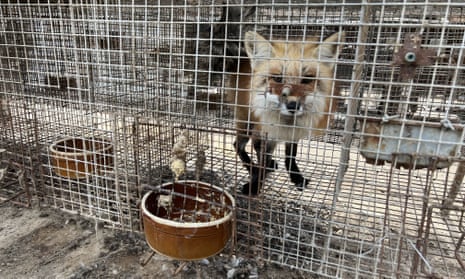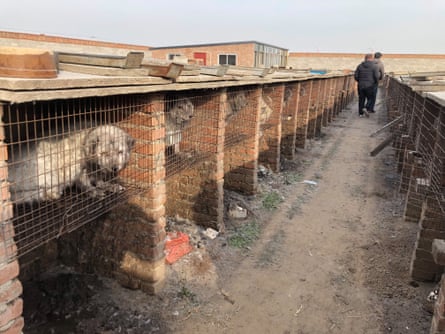Visits: 21

‘We keep pets and eat livestock, why not this?’: China’s defiant fur farmers
Business is declining amid growing awareness of animal abuse, but bans on fur farming in Europe could restore fortunes
“Now it’s a bad time to get into the fur business,” says a farm worker in Hebei province, northern China. The worker, who has been farming foxes for more than 30 years, says they have stopped after operating at a loss for several years in a row.
China is the world’s biggest producer of animal fur, but here in Suning county, its “capital of fur”, business appears quiet. “The whole industry chain – raw fur and garment production – is struggling,” says the farm worker.
An average of more than 4,000 fur enterprises deregistered their business licences each year between 2017 and 2019, according to Economic Daily, with an estimated 52% having quit the industry as of January 2022.
Data published by the China Leather Industry Association indicates that the total output of fur extracted from minks, foxes and raccoon dogs in China fell from 87m pelts in 2014, to 39m in 2019 and 27m in 2021.
Animal welfare campaigners say the industry has been hit by growing awareness of animal cruelty and by the use of other materials such hemp and frayed denim in place of fur.
At the Huasi International Fur City, home to more than 1,000 brands, retailers are also pessimistic. “We’ve been running this shop for five years, and business has gone downhill over the past few years, especially since the pandemic,” Mrs Zhang, a fur garment seller, tells the Guardian.

“More and more people are starting to boycott fur products, but I don’t think they see it from our perspective because they themselves aren’t involved in the industry. Some may call it greed, but we also keep pets and eat livestock, that’s because there is a demand, so how is it any different to fur trade?”
However, China’s fur production could yet increase after countries including Denmark culled millions of animals bred for their fur, and temporarily banned production because of fears that a Covid mutation could be a hazard to human health.
“As its global competitors such as Denmark and the Netherlands are losing their business and profits, there is a chance that China would seize this opportunity to gain a bigger share in the global market,” wrote the authors of a 2022 report published by non-profit group Act Asia.
With China’s Covid-zero era coming to an end, fur cities are already hoping revitalise the business. A press release from the Suning local government states: “China has the largest consumer market around the globe, and the end of Covid restrictions is creating sound conditions for a prosperous fur industry.” Suning hopes to become “the world’s capital of fur”.

Animal welfare campaigners are outraged at the prospect and have called on countries including the UK to stop importing animal fur. The UK introduced a ban on fur farming in 2003, but does not ban imports. Fur worth just under £30m has been imported from China in the past five years, according to Humane Society International/UK.
Recent footage from HSI’s campaign against fur farming in northern China has shown raccoon dogs, foxes and minks living in filthy cages barely larger than their body sizes, while past investigations have also shown foxes being electrocuted, beaten and even skinned alive.
“If fur is too cruel to be produced here, it should be too cruel to sell here, and until such a ban is introduced, the UK remains complicit in the very same fur cruelty we set out to ban two decades ago,” said Claire Bass, HSI/UK’s director of public affairs.
Peter Li, HSI’s China policy specialist, added: “China’s fur production can’t exist in isolation of the global market, and that global market is turning away from fur. China’s ban on the wildlife trade for consumption is a good start but in order to fully address potential future outbreaks, it is imperative that all countries permanently ban wildlife used for any purpose, and that includes fur production.”
You can send us your stories and thoughts at [email protected]

